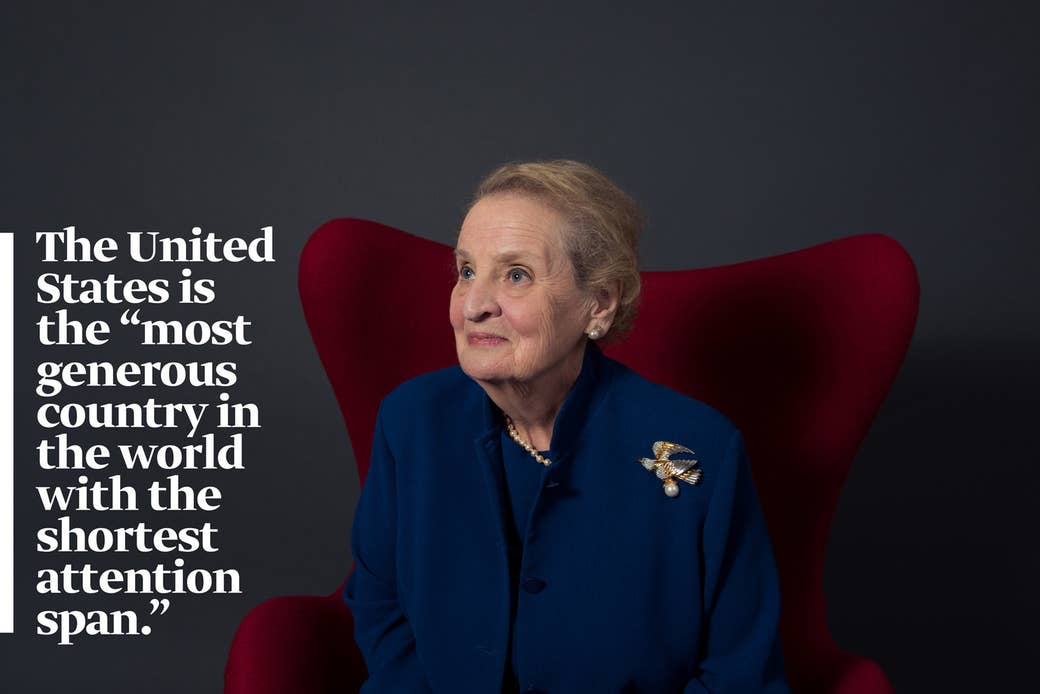
NEW YORK — The United States has "not properly understood the breadth and depth" of the ongoing refugee crisis, former Secretary of State Madeleine Albright told BuzzFeed News on Friday, calling recent pledges to take in more refugees inadequate.
"As a refugee myself ... I understand how important it is to be received somewhere with respect and a sense that you are not just a problem for everybody, that it's a human issue, and you are opportunity," Albright said.
"So I'm sorry that we're saying to everybody 'do more' and then we're only taking in 100,000 over five years, when I actually think we could do more," she continued, referring to an announcement from Secretary of State John Kerry in September.
The U.S. currently takes in 70,000 refugees annually and has to date taken in about 1,500 Syrian refugees total.
Albright's statement came during a sit-down interview in the BuzzFeed office alongside David Miliband, the British former Labour party politician and current head of the International Rescue Committee, to discuss the influx that has seen more than 218,000 people attempt to enter Europe by sea in October alone, the same number that made the voyage in all of 2014 combined.

Miliband pointed to the four-year-long civil war in Syria as a major cause of the current crisis, calling it a "gaping global failure." He also noted that refugees from Afghanistan and Somalia were also large portions of the population attempting to reach Europe.
"The point that is most striking to me, in Syria most notably: Delay in taking action leads to a delay, which leads to a worsening of options, which leads to further delay, which leads to the options getting worse again, and that's the vicious cycle we seem to be in," he said.
That cycle has seen funding for refugees plunge even as the number in need has risen over the past few years.
An effort from the White House to partner with Kickstarter raised more than $1.7 million, however, the U.N. High Commissioner for Refugees on Thursday announced that more than $90 million was needed for refugees in Greece and the Balkans alone this winter.
The United States is the "most generous country in the world with the shortest attention span," Albright lamented, adding that the crisis will need long-term attention. Miliband rejected the idea that indifference among civilians has crept in, however, placing the blame on governmental leadership in various countries.
The situation the world is facing is different than the refugee crisis that the Balkan Wars of the 1990s spawned, Albright — who was first U.N. Ambassador, then Secretary of State under Bill Clinton — told BuzzFeed News.
The numbers are far different, she said, as the flow from the former Yugoslavia never reached the scale seen currently. The time was really the beginning of social media, Albright continued, so families didn't know where various members had been scattered.
"It also seems to me there was more of a sense of compassion than there is now," Albright said. "I think part of what's happened is that the European Union has been under stress" due to the financial crisis, she continued, which makes it difficult for German Chancellor Angela Merkel and others to deal with backlash from their far right.

Miliband praised Germany's efforts on the crisis, stressing both the German people's overarching willingness to accept more refugees and the need for European cooperation on the matter.
"One of the reasons the EU was created was to cooperate with these kinds of issues, and in my perspective the U.K. should be part of that," he said.
More than 3,000 people have died while attempting to cross the sea to reach Europe this year, according to the United Nations. And those who survived the trek are straining the humanitarian aid system and governments alike.
The looming winter appears to be failing as a deterrent, leaving more people at risk of slipping through the cracks and facing harsh weather, "unlivable" camp conditions, or sexual assault as they go unaided.
